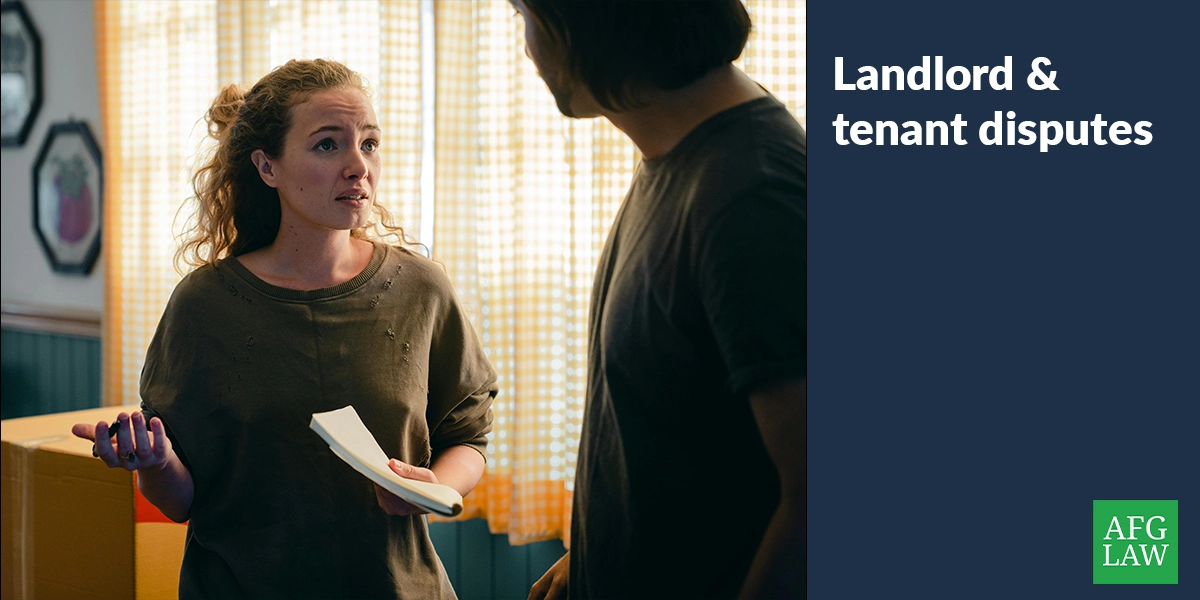Disputes between landlords and tenants are usually quite rare, but they do occur and knowing how to resolve them is vital for saving yourself a huge amount of time and money in the long run.
In this guide, we’ll explore some of the most common landlord and tenant disputes and what you should do if you find yourself in a dispute with your tenants.
Common landlord and tenant disputes
Landlord and tenant relationships can be complex, as well as being emotionally draining for both parties. Understanding common disputes can help both the landlord and the tenant to establish how to address their conflicts.
Common landlord and tenant disputes include, but are not limited to:
- Late rent payments - One of the main causes of disputes is due to late rent payments. Tenants may refuse to pay or withhold rent due to financial difficulties or as leverage in other disagreements.
- Property damage - Disagreements regarding who is accountable for property damage are very common. The challenge here is establishing what is normal wear and tear by the tenant and what damage has been caused by the tenants actions.
- Property repairs - Issues with property maintenance, like leaking roofs or mould, can result in disputes, especially if it seems like the landlord is ignoring or delaying repairs.
- Notices to tenants - Disputes can arise if notices have been improperly served, such as if the notice uses incorrect wording or it is delivered in the wrong method.
- Causing a nuisance - Tenant activities that cause an annoyance such as noise or smells can trigger disputes. These situations often require legal intervention and can lead to court orders or evictions.
- Pets - If a tenant has a pet contrary to the lease agreement, this can cause disputes and even escalate to eviction if not resolved through negotiation.
Methods of resolving landlord and tenant disputes
Resolving landlord and tenant disputes can be complicated, especially if this is your first time dealing with a situation like this. Thankfully, there are several methods that can be used to resolve the issues.
What is the first step in solving landlord and tenant disputes?
The first step to resolving landlord and tenant disputes should always be to attempt informal negotiations. This approach will encourage both parties to try and compromise, as well as aim to maintain a positive relationship.
If a middle ground cannot be reached through an informal discussion, seeking legal advice early-on is crucial. Consulting with our expert solicitors can help you to understand your legal rights and strengthen your position when it comes to negotiating.
Review the tenancy agreement
The first thing you should do is to understand what rights you have either as a landlord or a tenant. To do this, you should review your tenancy agreement.
The tenancy agreement serves as a legally binding contract that outlines the rights and responsibilities of both the landlord and the tenants. When a dispute arises, landlords should carefully review the terms of the tenancy to determine if the issue at hand breaches contractual agreements.
Drawing up a tenancy agreement that is designed to prevent any issues from arising in the first place can be vital for avoiding these situations. Our solicitors will be able to help you draw up a tenancy agreement on your behalf.
Communicate clearly
Whether you are a tenant or a landlord, it is essential that you communicate clearly in order to resolve any issues. As a landlord, you should encourage open dialogue with your tenants to discuss any concerns and explore potential solutions.
In some cases, mediation may be necessary. This involves a third-party mediator helping to facilitate constructive communication and assist in finding a mutually acceptable resolution. By introducing a culture of open communication, landlords can prevent disputes from spiralling and therefore, maintain a positive relationship with their tenants.
Document communications and actions
From the day a dispute is filed, it is crucial that you record all your communications with the other party regarding the dispute. Having a paper trail can be invaluable if the dispute is escalated and needs to be settled in court.
Documentation can include discussions with tenants, written communication, inspection reports, photographs of property conditions and any other evidence that would be relevant to the dispute.
Be willing to compromise
In most cases, compromising is the best way to avoid disputes being dealt with in court. No matter what the circumstances of the dispute are or the relationship with your tenant, try to look at the situation from an objective standpoint.
For many, settling the dispute out of court will be the most financially viable option and so it is important to bear this in mind before the situation escalates to court proceedings.
Seek legal advice from a solicitor
Although we always recommend using the court as a last resort, it is important to seek advice from a solicitor to know where you stand.
An experienced dispute resolution solicitor will be able to advise you with the next steps and guide you through your individual circumstances when it comes to your dispute. They will also be able to help with drafting formal notices, initiating legal proceedings or representing landlords in court if necessary.
At AFG Law, we have a team of dispute resolution solicitors who have years of experience in providing legal support for landlords across a wide variety of issues, including landlord and tenant disputes. Get in touch with our team today to see how we can help you.
